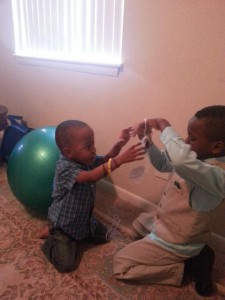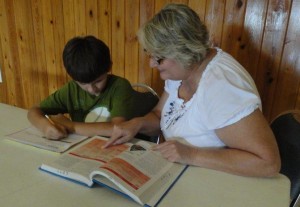by Angela Hinkle | Nov 21, 2014
 Gratitude doesn’t have to happen only on World Gratitude Day or around the Thanksgiving table. Happiness researchers have found that expressing gratitude has wide-ranging benefits. Counting your blessings on a frequent basis is associated with increased happiness. Grateful people are more likely to:
Gratitude doesn’t have to happen only on World Gratitude Day or around the Thanksgiving table. Happiness researchers have found that expressing gratitude has wide-ranging benefits. Counting your blessings on a frequent basis is associated with increased happiness. Grateful people are more likely to:
- take better care of themselves both mentally and physically
- get more regular exercise
- eat a healthier diet
- have improved mental alertness
- schedule regular physical examinations with their doctor
- cope better with stress and everyday challenges
- feel happier and more optimistic
- report more hours and better quality of sleep
- experience fewer physical symptoms like headaches, coughing, nausea, or pain
- have stronger immune systems
- maintain a brighter view of the future
So how do you put more thanks-giving and gratitude into your day? Try these suggestions to give yourself a boost:
- Be mindful of what you have. It’s not how much you have, but how you feel about what you have, that makes the difference.
- Write it down or share with a group that you meet with on a routine basis. This is a great way to continually give thanks.
- If someone thanks you, accept the thanks graciously. Let the person know you appreciate being thanked. You don’t need to do anything else. Honestly.
- Look for small things to be thankful for. The only person they have to be meaningful to is you. Here are some examples: “I found a parking space right away”; “It’s raining and I remembered my umbrella today”; “I was in a hurry and someone let me go in front of them in the line at the store”; “I had a good hair day.”
- If you write a thank you note, keep it short and simple. It’s not a big report that’s due or the novel you keep putting off writing. Just think of the reason for the thank you and be sincere. If you forgot to send a thank you note, don’t let the elapsed time be an excuse to avoid the task all together. You can send a quick email and then get to the real thing.
During the holiday season and throughout the year, enjoy and be thankful for the little and the big things and the kindnesses of others. Gratitude is good for your head, good for your heart, and good for your soul. And, just so you know, we take you very seriously – thanks for taking the time to read this message.

by Angela Hinkle | Jun 27, 2014
“School’s out!” Time to head outdoors to play.
In their Physical Activity Guidelines, the Department of Health and Human Services, http://www.health.gov, recommends at least one hour of moderate to vigorous physical activity every day for overall better health. No worries, though. You don’t have to do it all at once and what you and your family choose to do should be fun and keep your interest.
 Here are a few reminders when staying physical:
Here are a few reminders when staying physical:
- Water, water, and more water – make sure you replenish your fluids. Try drinking your water with ice, fruit, bendable straws, or from bottles with funky-colored sleeves to keep it interesting. Keep plenty of fruits and veggies on hand for snacks to stay hydrated as well.
- Apply, apply, and apply – sunscreen, that is. Set up a sunscreen station so everyone knows where to find the various bottles, sticks, and sprays of sunscreen. Small bottles of sunscreen with hooks that hang on belt loops are also becoming more readily available.
- Pick the best time of day for you. For many, earlier in the day or later in the afternoon are a little cooler, which makes it easier to be outside. (Unfortunately, those are mosquitoes’ favorite times of the day, too, so be sure to use protection against mosquito and other bug bites.)
- Pick the right environment. Make sure you have some shady spots or have the ability to come indoors to cool off.
- More water – water balloons, water squirters, and sprinklers are always fun. Poke holes in an empty plastic 2- liter soda bottle, attach a hose to the bottle opening, and hang it upside down to make a great outdoor shower.
So what are you waiting for? Go out and (safely) have some fun in the sun!
by Melanie Taylor | Jun 2, 2014

Summer camp teaches children independence and leadership skills.
Summer is here and summer camp is on the horizon. Maybe this is your child’s first time to an overnight camp or they are “old pros” at this thing called camp. Many parents and children will have camp anxieties, but here are some things you can do to prepare your camper and yourself for camp.
Campers:
• Plan several sleepovers before the week of camp arrives. Resist the urge to pack their bags for them or to check on them while there. If they have a cell phone, have them leave it at home. This is a good way to practice not having direct or constant contact.
• Encourage them to write a letter to someone (maybe you) while at camp. You will be so excited when you receive a letter from camp! Be sure to include envelopes, addresses, stamps, paper, and a pen in their luggage.
• Gear up physically. If you have purchased your camper new tennis shoes, have them break them in with a few long walks so the blisters don’t happen at camp.
• Especially for teenagers, have them take a mini-vacation from their electronic devices – a couple of hours or a weekend.
• Have them write a statement for their social media pages. “Peace out Facebook, I will be at camp for the next week. Check in with you when I get back” or something similar.
• Have them write down their goals for camp so they can mentally prepare themselves for what they hope to do and see.
• Make a homesick plan:
1. Homesickness isn’t entirely bad. It’s great to love your home. It’s sometimes part of the process and it’s a confidence-booster when a camper gets through it.
2. Make a “happy place” plan and write it down. This is an amazing opportunity to learn a life skill. Today’s youth go to technology to escape and studies show this increases their stress. Some ideas include: taking 10 deep breaths, traveling to a “happy place” in your mind, packing a certain stuffed animal, or tossing a football. Children are capable of this independence.
3. Your plan should NOT be, “Give it a couple of days and if you don’t like it, we will come get you.” This will set them up to give it a couple of days and knock the confidence right out of them.
4. Let your camper know what to expect with correspondence. You don’t need to write every day but let them know what to expect.
Parents:
• You are giving your child an incredible gift. I cannot promise you they will not lose some socks, they will love every meal or activity, and they will adore every staff member. But you are preparing them for college and beyond; you are giving them the freedom to gain confidence, independence, and leadership skills; and you are instilling in them that they can do it.
• What do YOU want to do during their time at camp? Plan a vacation for a later time, organize the house, or enjoy one-on-one time with your other children or some “date nights” with your spouse or friends.
• If you have apprehensions, work to resolve them. If you are worried your camper is not going to know anyone, set up a pre-camp get-together. If you are worried about your camper’s medical needs, become friendly with the camp staff. If you are anxious about their food allergies, talk to the camp’s director. Make a camper-sick plan for yourself. Make sure there is only excitement and optimism coming from you; share your anxiety with another adult.
• Pack self-addressed stamped envelopes in their luggage.
• Whether they are flying or driving, hold off on crying your eyes out until they cannot see you. Take a deep breath, trust, and remind yourself you are giving them an awesome gift.
And just what is this gift everyone is talking about? At camp, they will be part of a community all their own. They will become emotionally attached to handmade rope bracelets on their wrist, and have a song for any occasion on cue, and maybe even forget they need to shower, and think sunscreen is just a normal daily moisturizing technique. They will learn to do things on their own and they’ll learn to rely on others. They will learn how to survive on their own for a week or two and they’ll learn how to help each other through it.
They may even grow up on summers away from TV and forget Facebook exists. They will relish the joy of sleeping in cabins, swatting mosquitoes at campfire, and swimming every day. They will savor the feeling of pushing water behind them with a paddle and the whoosh of air behind the tail of an arrow as they fire. They’ll forget about appearances, relish tan lines, and recognize the beauty of a smile over anything else.
So send your kids to camp. Send them so they’ll learn to set tables and make beds and wake early. Send them so they’ll know how to be a leader, paddle a kayak, weave a bracelet, and sing as loud as they can. Send your kids to camp so they’ll learn to love themselves and learn to love others. Send your kids to camp because they’ll realize who they are – or who they want to be. And, prepare yourselves for a year of camp stories and for a flurry of songs. Prepare to learn names of kids you’ve never met. And for your kids to have a need for sunshine, campfires, and companionship. They will be forever grateful for your awesome gift of summer camp.
Source:
American Camping Association, Inc. (http://www.acacamps.org)
by Heidi Copeland | May 12, 2014
 Not much has changed since the American Academy of Pediatrics released their clinical report in 2006 about the importance of play in promoting healthy child development. In fact, play is so important to optimal child development that in 1989 the United Nations High Commission for Human Rights recognized play as a right of every child. Seriously! Play is essential to child development. Play contributes to the cognitive, physical, social, and emotional well-being of children and youth.
Not much has changed since the American Academy of Pediatrics released their clinical report in 2006 about the importance of play in promoting healthy child development. In fact, play is so important to optimal child development that in 1989 the United Nations High Commission for Human Rights recognized play as a right of every child. Seriously! Play is essential to child development. Play contributes to the cognitive, physical, social, and emotional well-being of children and youth.
Play is a child’s work. Play is how a child learns best. Play is the most effective way to involve every aspect of child development – cognitive, physical, social, and emotional well-being of children and youth. Play allows children to engage and interact in the world around them. Play enhances children’s learning readiness, learning behaviors, and problem-solving skills. Play is a simple joy that we should all remember as a cherished part of childhood.
Nonetheless, children and youth are experiencing decreased amount of child-directed, free unstructured play.
As another school year comes to an ends start thinking about the importance of this free, unstructured, child-driven play this summer. Are you allowing enough time in each day for your child to be running, bike riding, bouncing balls, climbing, and gazing up at the clouds actively using their imagination? Or are they going to be sitting and passively entertained through the screens of a television, computer, video game or even phone?
Think about it, play is a tried-and-true part of child rearing. Play also offers a perfect opportunity for parents to get fully involved with their children and youth.
Don’t buy into the next thingamajig that promises to make your child, better, brighter, happier, or more successful. Buy into the tried, trusted and traditional methods of play! The only thing you have to invest is quality time with your children and youth.
As the clinical report also mentions, adults who share unscheduled, spontaneous playtime with their children are being wonderfully supportive, nurturing and productive. What do you have to lose? Make some time to play today!
by Heidi Copeland | May 12, 2014
 The President of the United States of America, Barack Obama has proclaimed obesity a national, serious public health issue. As such, he is encouraging all Americans to learn about and engage in activities that promote healthy eating.
The President of the United States of America, Barack Obama has proclaimed obesity a national, serious public health issue. As such, he is encouraging all Americans to learn about and engage in activities that promote healthy eating.
How can you get involved? Let’s start with the family meal. There are many benefits to family meals. Families are more likely to eat a nutritious meal when most or all of the family eats together. Plus, families who eat at home have control of portion sizes and ingredient choices. Additionally, children who eat with their families are likely to consume more fruits, vegetables, and whole grains and less fat sugar and empty calories.
Research shows that adolescents are also less likely to smoke, drink, and use illegal drugs during their teen years. Enjoying family meals together enhances family communication and provides opportunities for families to share traditions, recipes and family heritage that can be handed down through each generation. And, family meals improve manners, too!
We are not talking about a Thanksgiving type spread here. A family meal can be breakfast, lunch or dinner. Nutrition experts state the meal does not even have to be enjoyed around the table. The important fact is that it is enjoyed together creating a lifetime of positive memories.
Cooking at home can be an intimidating task, but a rewarding one for you, your family, and your budget. Did I mention health?
Homemade meals are easy once you learn a few cooking basics. Once the basics are understood’ a cook can develop the confidence to be creative and experimental. Using family mealtimes as instructional times can also be a wonderful opportunity for you to teach your children how to cook good, healthy meals too.
Are you wondering how to get started?
The University of Florida, IFAS EDIS publications contain a wealth of information about purchasing, and preparing foods http://edis.ifas.ufl.edu/ (put cooking in the search bar). Another good resource is the Cook it Quick series by Alice Henneman, MS, RD, University of Nebraska Extension in Lancaster County http://food.unl.edu/fnh/cooking-school. Not only will you find quick tips and tricks but you can hone in on cooking techniques as well as find quick, healthy recipes.
Vow to prepare and eat more meals at home. You and your loved ones will be glad you did!
by Monica Brinkley | Sep 24, 2013
Normal
0
false
false
false
EN-US
X-NONE
X-NONE
/* Style Definitions */
table.MsoNormalTable
{mso-style-name:”Table Normal”;
mso-tstyle-rowband-size:0;
mso-tstyle-colband-size:0;
mso-style-noshow:yes;
mso-style-priority:99;
mso-style-parent:””;
mso-padding-alt:0in 5.4pt 0in 5.4pt;
mso-para-margin:0in;
mso-para-margin-bottom:.0001pt;
mso-pagination:widow-orphan;
font-size:11.0pt;
font-family:”Calibri”,”sans-serif”;
mso-ascii-font-family:Calibri;
mso-ascii-theme-font:minor-latin;
mso-hansi-font-family:Calibri;
mso-hansi-theme-font:minor-latin;}
Some children dread the thought of doing homework. They may leave an assignment for the last minute or refuse to do it all together. Many parents handle this by trying to force their children to do their homework. However, getting into a power struggle with your child is not effective. By having clear rules and expectations, you can create a positive situation for both you and your child.

Help children develop good study habits
Meaningful homework can help students do better in school, especially as they get into the upper grades. Homework teaches children responsibility, as well as how to follow directions, manage time, begin and complete a task, work on their own, and practice what they’re learning in class. However, most children would much rather be playing or doing other things than homework. Many parents and children struggle over when, where, and how homework will be done.
At times, parents may feel that it would be easier just to do the work for their children. However, the National Parent and Teacher Association advises parents to let children do homework themselves. You may need to sit with elementary-school-age children and walk them through the process of how to study, help them organize the materials they need, and make sure they’ve completed all their tasks. As you do this, you are laying the foundation for good study habits.
Parents can offer to help check homework, but helping is very different from taking over. You also can reinforce good habits by helping your child find a regular place to work and a regular time of day to do homework. Instead of asking if your child has homework every night, always assume that there is homework, reading, or studying of some kind to be done.
Here are some tips on things you can do to help your children with homework:
- Have a set time for your child to do homework.
- Get the whole family involved by setting a regular family quiet time for working. Provide your child with a comfortable and well-lit place where they can do homework, such as a desk or a kitchen table with a chair. Minimize distractions by turning off the TV and making video games off-limits during quiet time.
- Make sure your child has pens, pencils, notebook paper, and any other supplies. Know where to direct your child to get information they may need, such as a school, a website, other children in the class, or a teacher’s help before or after school.
- Think of yourself as a coach to your children, providing assistance on what to do next if they get stuck, checking over their work when they are finished, or even helping them practice testing themselves on new skills. Showing interest in their work and encouraging their efforts can be a boost for your children and help them find greater success in school.
- Avoid constantly nagging or lecturing your child to do homework. If your child is continuously frustrated by or unable to complete assignments, visit your child’s teacher. Discuss ideas to work out possible strategies to help your child succeed.
For further information, go to EDIS.IFAS.UFL.EDU.
Sources: FAR1718 Helping Children with Homework, Heidi Liss Radunovich; FCS2203 Parenting During the Elementary School Years, Part 2: Discipline, Millie Ferrer-Chancy, Ingrid Rivera and Anne M. Fugate.
 Gratitude doesn’t have to happen only on World Gratitude Day or around the Thanksgiving table. Happiness researchers have found that expressing gratitude has wide-ranging benefits. Counting your blessings on a frequent basis is associated with increased happiness. Grateful people are more likely to:
Gratitude doesn’t have to happen only on World Gratitude Day or around the Thanksgiving table. Happiness researchers have found that expressing gratitude has wide-ranging benefits. Counting your blessings on a frequent basis is associated with increased happiness. Grateful people are more likely to:





